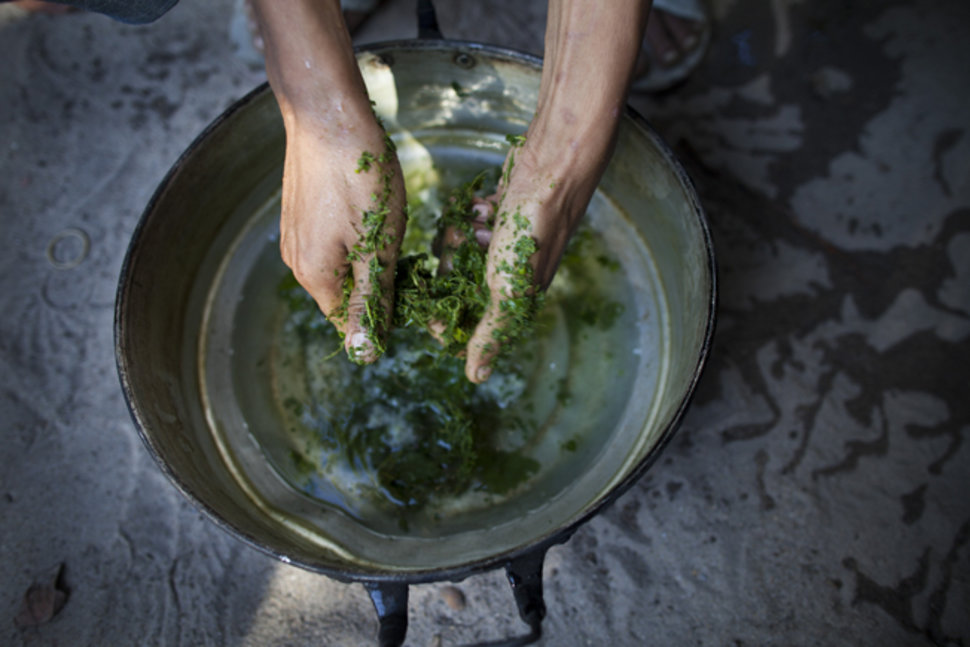DEA’s Sudden ‘Herbal Heroin’ Ban Triggers Stiff Resistance from Kratom Community
An increasingly popular plant product called “herbal heroin” by detractors is about to become illegal in the United States, sending a mad dash of users to online order forms, neighborhood shops and – if the plan pans out – a desperate march on the White House.
The Drug Enforcement Administration announced Tuesday it would make kratom a Schedule I substance after a 30-day waiting period, where it would remain for two or three years under an emergency scheduling order that ultimately could become permanent.
But advocates of continued legal access to products from the tree that grows in Indonesia, Thailand and neighboring countries aren’t surrendering to the action that would make kratom illegal for any purpose outside limited research. They’re fundraising to hire lawyers to fight the ban in court and to secure lobbyists and a public relations firm.
The American Kratom Association, a consumer group spearheading the effort, is planning a march on the White House for Sept. 13, two weeks before the ban takes effect. The association is led by founder Susan Ash and executive director Paul Pelosi Jr., the son of former House Speaker Nancy Pelosi.
Meanwhile, users on reddit, which has a nearly 11,000-subscriber subreddit r/kratom and thousands of upvoting readers of kratom-supporting posts on r/drugs, nervously discuss what to do. A Whitehouse.gov petition pleading for reconsideration has attracted more than 30,000 signatures.
The DEA says in its scheduling announcement in the Federal Register that kratom, which is not an opiate but acts on similar brain receptors, has been linked to 15 deaths in the U.S. and worryingly is being used as replacements for drugs such as heroin.
But those are fighting words for people like Ash, who says she uses the plant to manage pain caused by long-undiagnosed Lyme disease and as a safe replacement for the abusable and legal addiction medicine Suboxone.
“We’re all frankly feeling terrified,” she says. “At a time when our nation is seeing the largest opiate epidemic crisis in our history, there’s this cheap plant out there that’s helping people getting off opioids, and now people are saying they are going to be forced back into active addiction.”
A bottle with kratom liquid and a bag of capsules containing the herbal supplement, often sold at gas stations, are pictured on May 10, 2016, in Miami, Fla.
A bottle with kratom liquid and a bag of capsules containing the herbal supplement, often sold at gas stations, are pictured in Miami, Fla. JOE RAEDLE/GETTY IMAGES
Kratom cultivation is illegal in some parts of its native range, such as in Thailand, but Ash says anyone comparing its effects to heroin or other opioids lacks much experience in the traditionally abused substances, though she notes some unscrupulous businessmen have adulterated products marketed as kratom.
“We’re not a bunch of young kids flocking to tobacco shops looking for a legal high, which is what this keeps being called,” Ash says. “There is no actual high from kratom that you could dare compare to even the mildest opiate. There’s a mood boost that a lot of people are confusing with a high. … There’s a slight euphoria, but once you take it one or two times you don’t feel that again.”
Ash says a toxicologist hired by AKA reviewed the 15 deaths the DEA says occurred between 2014 and 2016 and in a forthcoming report disputes each finding of kratom toxicity as the cause of death. She says many were using other drugs and that she knew one of the deceased personally and that he was injecting experimental chemicals he bought online.
The association founder says consuming too much kratom induces vomiting, making it difficult to take too much, and that it doesn’t cause respiratory depression, a cause of death for opioid overdoses. She says she’s never heard from someone who suffered purported side-effects such as itchiness and hallucinations.
Jeremy Glass, a journalist reporting for thrillist.com, described in 2014 his experience drinking a kratom tea, writing, ”I’ve never felt this way before on any other drug: calm and collected without feeling like my brain is mush,” though toward the end of the experience he reported he “had trouble concentrating on the little things like writing texts, finding synonyms and remembering not to drool.”
Ash estimates that 60 percent of kratom users don’t have a history of addiction, and says that many use the plant in tea or pill form to treat pain or depression. A large number of veterans who have found no relief from pharmaceuticals for post-traumatic stress disorder use kratom, she says, adding, “I’m getting hundreds if not thousands of messages from people right now who are feeling suicidal.”
If anonymous discussion boards are to be believed, many people are stocking up on kratom during the one-month window in which it will remain legal. Many users of the forums said the plant could be useful in addressing a nationwide increase in drug overdoses.
“I kicked heroin with the help of kratom two months ago, and once about 8 years ago (with seven years clean in between). I’m familiar with using it both as a long term maintenance and also as a short term, cold turkey aid. I’m 100% clean and sober now,” one reddit user wrote.
“DEA doesn’t give a sh-t man. Look at how viciously they have opposed a down scheduling of marijuana. Some obscure drug like kratom stands no chance,” another wrote.
RELATED CONTENT
The man behind the current chocolate-snorting craze says the powder must be cut, or it will feel like a “chocolate jellyfish” in your nose.
Chocolate Snorting Appears Safe From Feds
If the ban takes effect in late September, stockpiled product will become illegal. Ash says the plant matter probably can last three years and that she’s not sure what she will do.
DEA spokesman Melvin Patterson says the agency acted following a boom in popularity and that the DEA likely will feel the need to make busts when the ban takes effect. He says it’s unwise to stock up, as that may result in more serious criminal charges.
“It’s real funny because it still will be considered a Schedule I and if they’re in possession of it they will be at risk, so I wouldn’t want to be stockpiling it – that only makes it worse,” he says. “Obviously, there are no actions DEA can take in the next 30 days, but thereafter things will change.”
After 30 days, he says, “I could see something happen to show this is serious.” To skeptics of the agency’s decision, he says: “What message are you saying when you say this drug is less dangerous than that drug?”
Emergency scheduling decisions are rare and notably included MDMA, the active ingredient in ecstasy. They are made upon consideration of three factors: a drug’s history and current pattern of abuse; the scope, duration and significance of abuse; and what risk there is to public health.
Though the Schedule I designation would make it more difficult for researchers to study potential medicinal benefits, Patterson says the attention commanded by the ban may spur efforts to better understand the plant.
“Shame on everyone who wasn’t researching it before. Now you start hearing the stories about how it’s benefiting someone suffering from arthritis,” he says. “If someone can find a medical use by it, by all means, we’re in favor of it.”
Patterson says he’s unaware of kratom being grown domestically.
Ash, who has a master’s degree in forestry, says she knows a few people who grow kratom in the U.S. but that unlike marijuana (which has been widely used and grown for decades despite being a Schedule I drug) it’s unlikely domestic supply of kratom could ever meet demand, as the tree must be grown in the tropics. Its height restricts indoor growing opportunities, she says.
The defense of kratom in many ways mirrors advocacy for legal access to marijuana, since a 1996 ballot initiative in California effectively legalized for medical use in 25 states and the nation’s capital.
It’s a plant, a major source of tax revenue and less harmful than legal Food and Drug Administration-approved medications, supporters charge. The pharmaceutical industry is afraid, they say, and the DEA ignorant.
Ash says if kratom does become illegal later this month, the association – which she says is not industry funded and has netted about $10,000 in user donations this week – hopes to file a lawsuit that would stall or overturn the ban. If that doesn’t happen, the group hopes states will authorize local markets after hearing from consumers.
RELATED CONTENT
This 1999 photo shows the University of Mississippi’s research-grade marijuana. For nearly five decades the school has been the sole supplier of marijuana for U.S. scientists.
DEA Ends One Pot Research Barrier, Keeps Another
In fact, to date much of the AKA’s work has been in state legislatures, where Ash says advocates fended off six of eight proposed state-level bans in the past legislative session.
“Our stories are so compelling that we can prevent bans from happening at the state level,” she says. Ash lived in one state that already has banned kratom, Tennessee, and says her indignation about its legal status there inspired her to advocacy. In another state where it recently has been banned, Alabama, she says she recently heard from a woman who has relapsed into opioid addiction.
Kratom use isn’t a magical substitute for opioid addiction for everyone. Some people appear to develop dependencies and then withdrawal symptoms.
A person identifying themselves as an academic neuropharmacologist who used kratom wrote a lengthy description of withdrawal symptoms and how to alleviate them in a dedicated page hosted by r/kratom.
“Days 2, 3, and sometimes 4, are similar in terms of discomfort. You may experience the full spectrum of opioid withdrawal symptoms to some degree: shakes, shits, sweats, kicks, yawning, goosebumps, tearing, congestion, salivation, restlessness, mood swings, etc… or not!” the user wrote. “The akathesia and restless leg syndrome feelings are the most uncomfortable features.”
Ash, however, says most people who experience withdrawal shouldn’t be using kratom in the first place. Anyone with a dependency should taper off their doses, she says.
RELATED CONTENT
The D.C. Cannabis Campaign is advertising a Saturday protest at the White House by driving an activist-filled cage to college campuses.
Hundreds Inhale at Surreal White House Pot Protest
“What happens when you stop coffee abruptly? You get all sorts of headaches and symptoms,” she says. “[After daily use], I quit [kratom] cold turkey for seven days and did not even have a runny nose.”
Pelosi did not respond to a tweet requesting comment, and Ash says he’s not yet publicly discussing the matter.
Patterson of the DEA says emergency scheduling decisions aren’t necessarily destined to become permanent. He points out that one compound, MDMA alternative TFMPP (trifluoromethylphenylpiperazine), was announced for emergency inclusion in Schedule I in 2002 but currently is unscheduled.
“FDA did some extra testing on it and said it shouldn’t be Schedule I and we followed suit,” he says. “It fell right off.”
MORE
Tags: drugs, Drug Enforcement Administration
Steven Nelson STAFF WRITER
Steven Nelson is a reporter at U.S. News & World Report. You can follow him on Twitter or reach him at snelson@usnews.com.
Latest Videos
Okla. Cops Pepper Spray Elderly Woman
AP
Waves Sweep Over Road in Tampa, FL
Weather Channel
Brock Turner released from jail
KERO – Bakersfield, CA
Okla. Cops Pepper Spray Elderly Woman
AP
Waves Sweep Over Road in Tampa, FL
Weather Channel
More videos:
Waves Sweep Over Road in Tampa, FL
Brock Turner released from jail
Okla. Cops Pepper Spray Elderly Woman
Waves Sweep Over Road in Tampa, FL
Brock Turner released from jail
Okla. Cops Pepper Spray Elderly Woman
Waves Sweep Over Road in Tampa, FL
Brock Turner released from jail
Okla. Cops Pepper Spray Elderly Woman
Popular Articles
What Trump Advisers Want Him to Tell African-Americans
Economy Adds Lackluster 151,000 Jobs in August
Putin Says DNC Hacks Not From Him
10 Countries With the Most Geniuses Per Capita
Scientists Are Excited About Possibility of ‘New’ Planet






